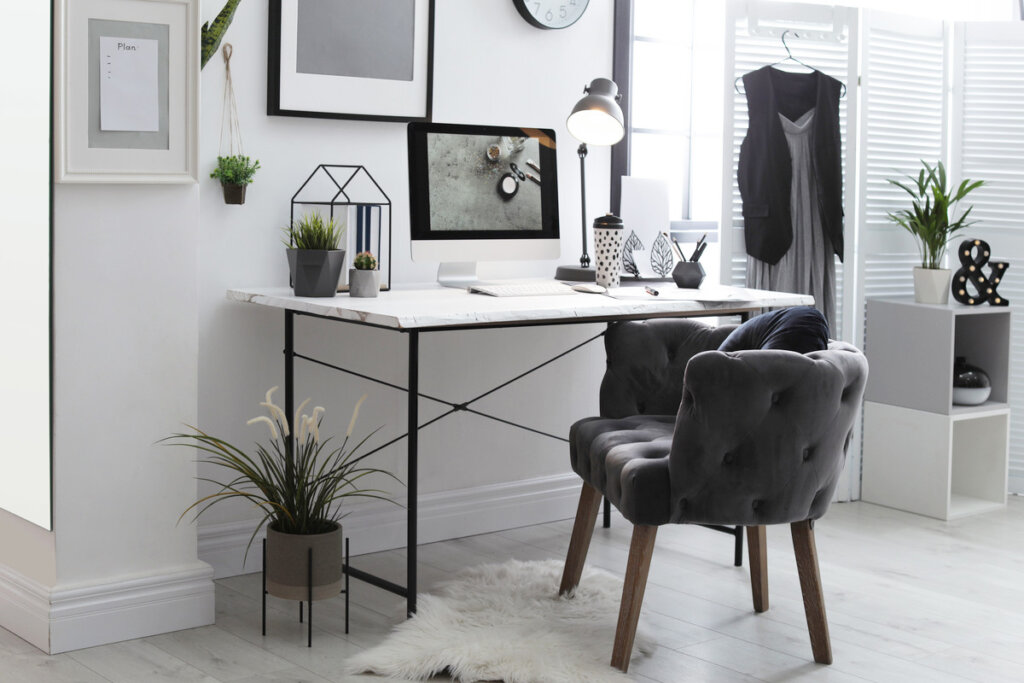When you’re a freelancer, your days are likely to be spent juggling various types of tasks.
Not to mention that you’ll need to meet the deadlines and expectations of your clients.

Maintaining your freelancer productivity is key to your success.
One of the most important tools for your productivity is the space you work in.
Creating an optimized home office empowers you to develop a freelancing practice that’s good for your career and your work-life satisfaction. So, what goes into creating this perfect home office?
We’re going to examine a few of the critical factors to consider.
Choosing the Right Space
The first step in building a productive home office is finding the right space for it.
Yes, your options may be relatively limited by your finances, the size of your home, or even how many people live there.
But if you’re trying to create the perfect area for your freelance productivity, it’s well worth looking around for possibilities.
Even if you’re checking your home for options to commandeer part of an already-used room, don’t just look at which space you can squeeze in a desk and settle for that.
Consider what would make your choices of spaces most conducive to your daily needs.
For instance, natural light can boost your mood and cognitive function, so choosing a room with a large window may be a priority. A room you can partition between work and leisure is ideal.
From here, you can start to decide how to adapt the space available to you by consolidating items already in the room or putting them in storage.
If you have the budget, another option is to build a shed or repurpose a garage for your home office.
Doing so gives you a little more freedom to customize your space to meet your exact needs and preferences, while also enabling you to assert boundaries between your freelance working life and personal life.
Alongside budgeting for materials and labor, you need to get familiar with building codes for home additions, such as sheds and other outbuildings.
Each type of building and even the state you live in can mean you must meet different regulations and apply for various licenses.
For instance, while sheds may not need the full building project plan to be submitted in the same way home additions do, some states may require you to get a subject-to-field inspection permit.
Contacting your local authority to check this can help you avoid risking fines and other penalties.
Making the Office Fit for Focus
Once you have your space, one of the keys to productivity is ensuring you can maintain your focus for the hours you’ll spend there.
Doing so isn’t always easy, particularly if you live in a bustling city apartment or have young family members constantly moving around your home.
You can take some steps to reduce distractions and concentrate on your work so you can finish on time and enjoy your free time.
Some of these steps include:
- Soundproofing: The most basic way to shut out the noise of a bustling family home is to ensure your office has a door you can close. However, this isn’t always sufficient, particularly if you have noisy neighbors or a lot of outdoor traffic nearby. You can implement some relatively simple soundproofing solutions, such as hanging heavy drapes in front of your office door or ensuring your windows are properly sealed. Thick rugs and soft cushions can also dampen noises, which usually reflect from flat surfaces.
- Minimizing clutter: There are certainly freelancers who thrive when surrounded by chaos. Nevertheless, something as simple as decluttering a workspace of any unnecessary items can help you maintain focus and reduce stress. If it is essential to have a lot of different items close by, it may be wise to get some filing cabinets. Wherever possible, shift to paperless practices. Eliminating paperwork frees you from the tyranny of mail clutter.
Remember, too, that focus is a very personal state of mind.
Different people require varied conditions to achieve peak concentration.
You can help yourself make informed decisions by creating a list of what supports or disrupts your focus.
Investing in Supportive Resources
It’s not just the space you choose or its atmosphere that matters. The resources you incorporate into your home office can also support greater productivity.
There are various types of items you can invest in here. Rest assured that you don’t have to get everything immediately.
Like running any small business, one of the realities of freelancing is that it’s more sensible to prioritize your needs and gradually build your resources over time. Nevertheless, it’s important to know what resources are helpful and start investing early on.
Ergonomic furniture is an excellent place to start. Many freelancers spend most of their days sitting in front of a computer.
Therefore, furniture that supports correct posture is essential to your ongoing wellness. In turn, this boosts your productivity by minimizing the potential for injuries that slow you down and time off for physiotherapy appointments.
Some items to consider here include chairs that have multiple points of adjustability — from seat angle to headrest positioning — and screen risers for your monitor or laptop.
It’s equally vital to invest in supportive digital tools for your home office, too.
Software that helps make remote workers more productive boosts your productivity by streamlining your tasks.
This may include cloud project management tools that enable you to keep track of your tasks and deadlines, alongside sharing key files with collaborators.
You can also consider accounting software that enables you to automate aspects of your financial administration, such as data entry and invoice reminders.
Conclusion
The perfect home office for a productive freelance life can take a little time to get right, but it’s more than worthwhile. There are various areas to focus on, from finding a solid space to populating it with supportive resources.
Remember that you don’t have to work there all the time, though.
You can keep a schedule in which you work at home some days and from shared space at times when being surrounded by others is conducive to your productivity.
Think of your home office as another tool to boost the success of your independent career path.



1 Comments